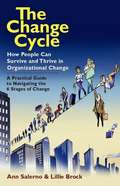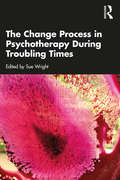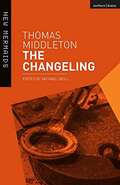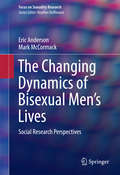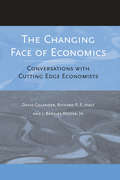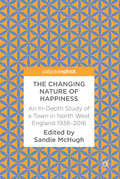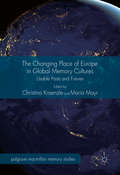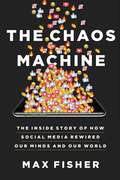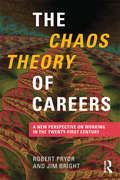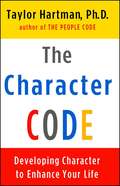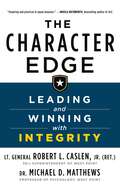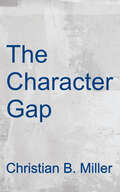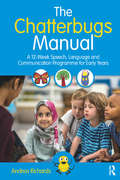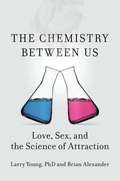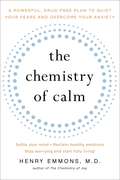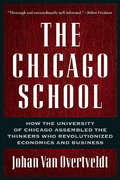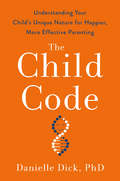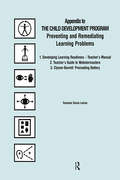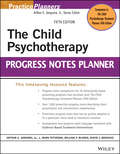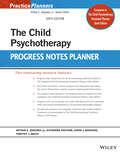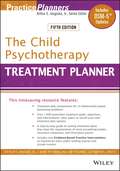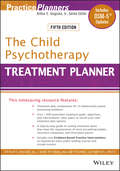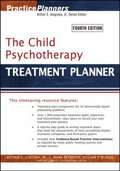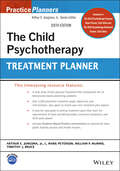- Table View
- List View
The Change Cycle: How People Can Survive and Thrive in Organizational Change
by Ann Salerno Lillie BrockThe Change Cycle will help readers to more resourcefully cope with change at work by helping them understand and predict their behavior and the behavior of others.
The Change Process in Psychotherapy During Troubling Times
by Sue WrightThe Change Process in Psychotherapy During Troubling Times invites readers to consider what it is psychotherapists do that leads to change. The book highlights different theoretical approaches, questions old paradigms, and illustrates the change process when working with people facing a range of life challenges such as the survivors of childhood trauma, refugees, and people dealing with traumatic loss. Moving between consideration of micro-moments when working with individual clients and bigger questions about how to promote change in the face of current world problems, it addresses issues that touch us all. At the same time, the book acknowledges the unprecedented challenges in today’s world such as the pace of change, the thousands of displaced people who seek refuge in other countries, the illness and loss caused by the coronavirus pandemic, and the impact of climate change on lifestyles and the environment. The book presents a topical consideration of the relevance of therapeutic assumptions, theories, and practices to current global crises. With the breadth of presenting issues considered and the examples of a variety of creative approaches supporting change, the book will be useful to psychotherapists in practice and in training working in a range of settings with different populations. It will also be of interest to others working in the helping professions.
The Changeling: Revised Edition (New Mermaids)
by Michael Neill Thomas Middleton William Rowley“The next good mood I find my father in, I'll get him quite discarded” <p><p> With these chillingly offhand words, Beatrice-Joanna, the spoilt daughter of a powerful nobleman, plots to get rid of the family servant who has crossed her once too often. The Changeling's vivid tale of sexual appetite, repulsion, betrayal and lunacy remains one of the most compelling tragedies of the 17th century. Exposing the vexed relationship between servants and masters, setting notions of `change' against the revelation of psychological 'secrets' as ways of explaining human behaviour, and exploring the idea of love as a `tame madness', the play reveals the terrifying consequences of ungoverned sexual appetite and betrayal. Featuring the full and modernized play text, this revised edition includes incisive commentary notes which explain the nuances of the play's vibrant, colloquial language and demonstrate its sly delight in the characters' conscious and unconscious wordplay. Michael Neill's illuminating introduction provides a firm grounding in the play's socio-political context, demonstrates how careful close-reading can expand your enjoyment of the play, explains the play's violent linkage of comic and tragic plots and gives theatrical life to the text via a discussion of its stage history, with a particular emphasis on the most interesting recent productions. <p><p> The New Mermaids plays offer: · Modernized versions of the play text edited to the highest textual standards · Fully annotated student editions with obscure words explained and critical, contextual and staging insight provided on each page · Full Introductions analyzing context, themes, author background and stage history
The Changing Dynamics of Bisexual Men's Lives
by Mark Mccormack Eric AndersonThis important book provides unique new knowledge on thelived experience of openly bisexual men without medicalizing or pathologizingthem. Presenting research from sexology, sociology, and psychology, it featuresextensive findings on the sexual, social, romantic, and emotional behaviors ofthe 90 men interviewed in the U. S. and U. K. Issues and challenges are examinedin such areas as identity and self-concept, along with the burden of socialerasure and the paradox of stigma from both the gay and straight communities. However, the research reveals evidence of a recent cultural transition towardacceptance of bisexual identity and behavior, with younger bisexual menexperiencing better social lives and increased recognition of the legitimacy ofbisexuality. Among the topics covered: Examining the components of sexuality. Measuring and surveying bisexuality. Bisexual burden Demonstrating a generational cohort effect Expansion of gendered boundaries. Erosion of the one-time rule of homosexuality. Coming out in the 21st century. Bringing clarity and focus beyond the gender binary--andcompelling insights into why society and science have trouble shedding thatparadigm--The Changing Dynamics ofBisexual Men's Lives will interest sexuality scholars, sexologists, andsocial scientists studying the social aspects of sexuality.
The Changing Face Of Economics: Conversations with Cutting Edge Economists
by J. Barkley Rosser David C. Colander Richard P. F. HoltThe Changing Face of Economics gives the reader a sense of the modern economics profession and how it is changing. The volume does so with a set of nine interviews with cutting edge economists, followed by interviews with two Nobel Prize winners, Paul Samuelson and Kenneth Arrow, reflecting on the changes that are occurring. What results is a clear picture of today's economics--and it is no longer standard neoclassical economics. The interviews and commentary together demonstrate that economics is currently undergoing a fundamental shift in method and is moving away from traditional neoclassical economics into a dynamic set of new methods and approaches. These new approaches include work in behavioral economics, experimental economics, evolutionary game theory and ecological approaches, complexity and nonlinear dynamics, methodological analysis, and agent-based modeling. David E. Colander is Professor of Economics, Middlebury College. J. Barkley Rosser, Jr. , is Professor of Economics and Kirby L. Kramer Jr. Professor of Business Administration, James Madison University. Richard P. F. Holt is Professor of Churchill Honors and Economics, Southern Oregon University.
The Changing Nature of Happiness
by Sandie McHughThis book shines a light on the meaning of happiness and how public perceptions of it have changed over time. A question that has engaged philosophers from the days of Aristotle, happiness is a subject of growing academic interest, and its recent integration into government policy is provoking increased debate into its definition and nature. Sandie McHugh and her associates build on the work of social anthropologist Tom Harrison's 'Worktown' Mass Observation study from 1938, repeating the original study today. Together these accounts show how perceptions of happiness have changed over the years for the people of Bolton, UK, and reveal major difference between its definition then and now. This unique study is a useful tool in the understanding and study of happiness, offering invaluable insights for scholars and practitioners working in the fields of social psychology, positive psychology, health psychology and wellbeing.
The Changing Place of Europe in Global Memory Cultures
by Christina Kraenzle Maria MayrThis book investigates the transnational dimensions of European cultural memory and how it contributes to the construction of new non-, supra, and post-national, but also national, memory narratives. The volume considers how these narratives circulate not only within Europe, but also through global interactions with other locations. The Changing Place of Europe in Global Memory Cultures responds to recent academic calls to break with methodological nationalism in memory studies. Taking European memory as a case study, the book offers new empirical and theoretical insights into the transnational dimensions of cultural memory, without losing sight of the continued relevance of the nation. The articles critically examine the ways in which various individuals, organizations, institutions, and works of art are mobilizing future-oriented memories of Europe to construct new memory narratives. Taking into account the heterogeneity and transnational locations of commemorative groups, the multidirectionality of acts of remembrance, and a variety of commemorative media such as museums, film, photography, and literature, the volume not only investigates how memory discourses circulate within Europe, but also how they are being transferred, translated, or transformed through global interactions beyond the European continent.
The Chaos Machine: The Inside Story of How Social Media Rewired Our Minds and Our World
by Max FisherFinalist for the Helen Bernstein Book Award for Excellence in JournalismFrom a New York Times investigative reporter, this &“authoritative and devastating account of the impacts of social media&” (New York Times Book Review) tracks the high-stakes inside story of how Big Tech&’s breakneck race to drive engagement—and profits—at all costs fractured the world. The Chaos Machine is &“an essential book for our times&” (Ezra Klein). We all have a vague sense that social media is bad for our minds, for our children, and for our democracies. But the truth is that its reach and impact run far deeper than we have understood. Building on years of international reporting, Max Fisher tells the gripping and galling inside story of how Facebook, Twitter, YouTube, and other social network preyed on psychological frailties to create the algorithms that drive everyday users to extreme opinions and, increasingly, extreme actions. As Fisher demonstrates, the companies&’ founding tenets, combined with a blinkered focus on maximizing engagement, have led to a destabilized world for everyone. Traversing the planet, Fisher tracks the ubiquity of hate speech and its spillover into violence, ills that first festered in far-off locales, to their dark culmination in America during the pandemic, the 2020 election, and the Capitol Insurrection. Through it all, the social-media giants refused to intervene in any meaningful way, claiming to champion free speech when in fact what they most prized were limitless profits. The result, as Fisher shows, is a cultural shift toward a world in which people are polarized not by beliefs based on facts, but by misinformation, outrage, and fear. His narrative is about more than the villains, however. Fisher also weaves together the stories of the heroic outsiders and Silicon Valley defectors who raised the alarm and revealed what was happening behind the closed doors of Big Tech. Both panoramic and intimate, The Chaos Machine is the definitive account of the meteoric rise and troubled legacy of the tech titans, as well as a rousing and hopeful call to arrest the havoc wreaked on our minds and our world before it&’s too late.
The Chaos Theory of Careers: A New Perspective on Working in the Twenty-First Century
by Jim Bright Robert PryorThe Chaos Theory of Careers outlines the application of chaos theory to the field of career development. It draws together and extends the work that the authors have been doing over the last 8 to 10 years. This text represents a new perspective on the nature of career development. It emphasizes the dimensions of careers frequently neglected by contemporary accounts of careers such as the challenges and opportunities of uncertainty, the interconnectedness of current life and the potential for information overload, career wisdom as a response to unplanned change, new approaches to vocational assessment based on emergent thinking, the place of spirituality and the search for meaning and purpose in, with and through work, the integration of being and becoming as dimensions of career development. It will be vital reading for all those working in and studying career development, either at advanced undergraduate or postgraduate level and provides a new and refreshing approach to this fast changing subject. Key themes include: Factors such as complexity, change, and contribution People's aspirations in relation to work and personal fulfilment Contemporary realities of career choice, career development and the working world
The Character Code: Developing Character to Enhance Your Life
by Taylor HartmanDevelop your character -- and powerfully improve the quality of your lifeIn The Color Code, Taylor Hartman defined the characteristics of the four basic personality types and assigned a color to each. In this exciting sequel, he builds on his groundbreaking research, showing you how to use your color profile as a guide to cultivating a full and balanced character.The essence of character is the ability to enhance not only our own lives, but the lives of others as well. Here, Dr. Hartman gives you the tools you need to unlock your true potential, including engaging case histories, clearly articulated principles, and step-by-step exercises for:Recognizing your innate -- and developed -- strengthsIdentifying your core motivationsCommunicating more effectivelyFocusing your commitmentsDiscovering the importance of character "stretching"Presented with refreshing style and candid professionalism, this revolutionary guide provides tremendous counsel for identifying and embracing an enhanced life.
The Character Edge: Leading and Winning with Integrity
by Michael D. Matthews Robert L. Caslen Jr.The former superintendent at West Point and a psychologist explain why all successful leaders rely on a foundation of strong character. Among the most successful leaders throughout history—from Abe Lincoln to Rosa Parks, Mahatma Gandhi to Susan B. Anthony, Martin Luther King, Jr. to Nelson Mandela—some were brilliant mathematicians and economists, others were creative visionaries, still others were masterful at strategic planning. Their mastery of their field wasn’t the secret to their highly effective leadership. All of their skill, grit, resilience, charisma, and courage emanated from one thing: their strength of character.Character—the moral values and habits of an individual—is in the spotlight now more than perhaps at any other point in modern history. Politicians distort facts. Corporations cheat customers and investors. Athletes are caught using illegal supplements. In addition to harming our culture at large, these failures of character have a profound and undermining impact on leadership.The authors of this book are experts on the value of character, its correlation with successful leadership, and how to build it in individuals and prospective leaders. General Robert L. Caslen, Jr. served the US Army for over 43 years and served as Superintendent at the US Military Academy at West Point. Psychologist Dr. Michael D. Matthews is a Professor of Engineering Psychology at West Point who has focused on the psychology of character for years. Together they witnessed firsthand that raw talent is not enough to stand on its own; successful leadership relies on the critical foundation of a strong character.In The Character Edge they leverage their perspectives to offer an empowering, story-driven argument—backed by the latest scientific research—that character is vital to success. They give readers the tools to build and sustain character in themselves and their organizations by testing readers' strengths of the gut, head and heart and teaching how to build trust and nurture the seeds of character.
The Character Gap: How Good Are We? (Philosophy in Action)
by Christian MillerWe like to think of ourselves, our friends, and our families as decent people. We may not be saints, but we are still honest, relatively kind, and mostly trustworthy. Miller argues here that we are badly mistaken in thinking this. Hundreds of recent studies in psychology tell a different story: that we all have serious character flaws that prevent us from being as good as we think we are - and that we do not even recognize that these flaws exist. But neither are most of us cruel or dishonest. Instead, Miller argues, we are a mixed bag. On the one hand, most of us in a group of bystanders will do nothing as someone cries out for help in an emergency. Yet it is also true that there will be many times when we will selflessly come to the aid of a complete stranger - and resist the urge to lie, cheat, or steal even if we could get away with it. Much depends on cues in our social environment. Miller uses this recent psychological literature to explain what the notion of "character" really means today, and how we can use this new understanding to develop a character better in sync with the kind of people we want to be.
The Chatterbugs Manual: A 12-Week Speech, Language and Communication Programme for Early Years
by Andrea RichardsThe Chatterbugs Manual is a practical resource for all those supporting the development of the foundation communication skills of attention and listening, turn-taking and early vocabulary in children. The Chatterbugs programme has been designed to bridge the gap between education and specialist speech, language and communication provision, specifically with Early Years mainstream settings in mind. It enables school staff to prepare children—including those with delayed communication skills, EAL learners, or children with suspected special education needs—for learning in school by developing their communication skills through the use of robust communication strategies. The Chatterbugs Manual contains: An overview of the programme, including step-by-step instructions on how to plan and deliver a Chatterbugs session Guidance on identifying children likely to benefit from the programme Progress Tracking documents, along with information on measuring outcomes Child-friendly, illustrated session resources Frequently Asked Questions A parent-friendly information leaflet Information on models of implementation Information on accessing training and support Developed by an experienced speech and language therapist, Chatterbugs has consistently recorded successful outcomes for over 80% of participants since the programme’s inception in 2012, and for over 90% of participants since 2016. With its hands-on approach, the programme is an essential resource for educators, support staff, and speech and language therapists working with Early Years children.
The Chemistry Between Us
by Brian Alexander Larry YoungHow much control do we have over love? Much less than we like to think. All that mystery, all that poetry, all those complex behaviors surrounding human bonding leading to the most life-changing decisions we'll ever make, are unconsciously driven by a few molecules in our brains. How does love begin? How can two strangers come to the conclusion that it would not only be pleasant to share their lives, but that they must share them? How can a man say he loves his wife, yet still cheat on her? Why do others stay in relationships even after the romance fades? How is it possible to fall in love with the "wrong" person? How do people come to have a "type"? Physical attraction, jealousy, infidelity, mother-infant bonding--all the behaviors that so often leave us befuddled--are now being teased out of the fog of mystery thanks to today's social neuroscience. Larry Young, one of the world's leading experts in the field, and journalist Brian Alexander explain how those findings apply to you. Drawing on real human stories and research from labs around the world, The Chemistry Between Us is a bold attempt to create a "grand unified theory" of love. Some of the mind-blowing insights include: Love can get such a grip on us because it is, literally, an addiction. To a woman falling in love, a man is like her baby. Why it's false to say society makes gender, and how it's possible to have the body of one gender and the brain of another. Why some people are more likely to cheat than others. Why we sometimes truly can't resist temptation. Young and Alexander place their revelations into historical, political, and social contexts. In the process, they touch on everything from gay marriage to why single-mother households might not be good for society. The Chemistry Between Us offers powerful insights into love, sex, gender, sexual orientation, and family life that will prove to be enlightening, controversial, and thought provoking.
The Chemistry of Calm: A Powerful, Drug-Free Plan to Quiet Your Fears and Overcome Your Anxiety
by Henry Emmons, MDBlending Eastern techniques of meditation with traditional Western solutions of diet and exercise, celebrated psychiatrist Dr. Henry Emmons offers a proven plan to combat anxiety—without medication—that has helped tens of thousands gain inner peace and start enjoying life.The debilitating effects of anxiety can affect your sense of well-being, health, longevity, productivity, and relationships. In The Chemistry of Calm, Dr. Henry Emmons presents his Resilience Training Program—a groundbreaking regimen designed to relieve anxiety and restore physical and mental strength. This step-by-step plan for mental calmness and emotional wisdom focuses on ways to create resilience as a key to resolving anxiety in everyday life, incorporating the latest science on: -Diet—you&’ve got to eat good food to feel good -Exercise—it&’s proven: moving makes you less anxious -Nutritional Supplements—boosting your natural anxiety resistance -Mindfulness—including meditation techniques to calm your body and brain Using this program, Dr. Emmons has helped countless patients reduce their anxiety and reclaim the resilience that is their birthright. Now, with The Chemistry of Calm, you can be anxiety free too!
The Chicago School: How the University of Chicago Assembled the Thinkers Who Revolutionized Economics and Business
by Johan Van OvertveldtThis “admirably detailed and thoroughly welcome history” provides a fascinating examination of a pivotal moment in the evolution of economic theory (The Economist).When Richard Nixon said “We are all Keynesians now” in 1971, few could have predicted that the next three decades would result in a complete transformation of the global economic landscape. The transformation was led by a small, relatively obscure group within the University of Chicago’s business school and its departments of economics and political science. These thinkers — including Milton Friedman, Gary Becker, George Stigler, Robert Lucas, and others — revolutionized economic orthodoxy in the second half of the 20th century, dominated the Nobel Prizes awarded in economics, and changed how business is done around the world.Written by a leading European economic thinker, The Chicago School is the first in-depth look at how this remarkable group came together. Exhaustively detailed, it provides a close recounting of the decade-by-decade progress of the Chicago School’s evolution. As such, it’s an essential contribution to the intellectual history of our time.
The Child Code: Understanding Your Child's Unique Nature for Happier, More Effective Parenting
by Danielle DickA provocative, science-based approach to parenting centered on a child&’s unique genetic &“code,&” from an award-winning developmental psychology professor and researcher. With few exceptions, parenting books, websites, and podcasts emphasize the critical role of the parent in shaping a child&’s destiny. But the obsession with parenting ignores a fundamental biological fact: that genetics affect every aspect of human behavior, and every child is uniquely &“coded&” with predispositions that affect everything from fearfulness, to impulsivity, to happiness. In The Child Code, award-winning professor Dr. Danielle Dick draws from her research in developmental behavior genetics to debunk the myth that parenting techniques alone can determine a child&’s behavior and future. Dr. Dick introduces readers to the 3 E&’s that underlie each child&’s unique predisposition—extraversion (Ex), emotionality (Em), and effortful control (Ef)—and shows that, in fact, the key to raising successful adults isn&’t to try harder to mold them, but to adapt your parenting strategies to the way they are wired. This powerful and fresh approach not only diminishes friction and stress in families, but sets children up for true, authentic success in life. Each chapter unpacks the science behind this unique approach, and provides practical, individualized strategies for parents to support their child&’s strengths and to help them navigate their challenges. Reassuring, with real takeaways, The Child Code offers parents an inspiring message: Their biggest job is to help their children become who they were literally born to be.
The Child Development Associate® National Credentialing Program and CDA Competency Standards (Preschool Edition)
by Council for Professional RecognitionThis book gives candidates working with preschoolers, ages 3-5, everything they will need to prepare and apply for the CDA Credential. It replaces the current "application packets" as it now includes complete information on the credentialing process, the CDA Competency Standards and all of the forms a candidate will use, including an application, Family Questionnaires, and the official Comprehensive Scoring Instrument (the Observation Tool) used by the CDA Professional Development Specialist, as of June 1, 2013.
The Child Development Program: Preventing and Remediating Learning Problems
by Suzanne Sosna Levine"The Child Development Program: Preventing and Remediating Learning Problems" is divided into two books. The first book outlines the Child Development Program, specifically explaining what it is and how it can be implemented. It is written in sensible, straightforward language, describing the procedures, materials, and "how-to" every step of the way.
The Child Psychotherapy Progress Notes Planner
by L. Mark Peterson Arthur E. Jongsma Jr. William P. Mcinnis David J. BerghuisSave hours of time-consuming paperwork The Child Psychotherapy Progress Notes Planner, Fifth Edition contains complete prewritten session and patient presentation descriptions for each behavioral problem in the Child Psychotherapy Treatment Planner, Fifth Edition. The prewritten progress notes can be easily and quickly adapted to fit a particular client need or treatment situation. Saves you hours of time-consuming paperwork, yet offers the freedom to develop customized progress notes Organized around 35 main presenting problems, from academic underachievement and obesity to ADHD, anger control problems, and autism spectrum disorders Features over 1,000 prewritten progress notes (summarizing patient presentation, themes of session, and treatment delivered) Provides an array of treatment approaches that correspond with the behavioral problems and DSM-5 diagnostic categories in The Child Psychotherapy Treatment Planner, Fifth Edition Offers sample progress notes that conform to the requirements of most third-party payors and accrediting agencies, including CARF, TJC, and NCQA Presents new and updated information on the role of evidence-based practice in progress notes writing and the special status of progress notes under HIPAA
The Child Psychotherapy Progress Notes Planner (PracticePlanners #301)
by Timothy J. Bruce Arthur E. Jongsma Jr. David J. Berghuis Katy PastoorCreate effective treatment plans for children quickly and efficiently The newly revised sixth edition of the Child Psychotherapy Treatment Planner is a timesaving, easy-to-use reference for practitioners seeking to clarify, simplify, and accelerate the treatment planning process so you can spend less time on paperwork and more time with your clients. Each chapter begins with a new evidence-based Short-Term Objective and two new Therapeutic Interventions, emphasizing evidence-based and empirically supported interventions likely to be effective and meaningful in therapy. The latest edition also contains new and revised evidence-based Objectives and Interventions, more professional resources and best-practice citations for the non-EBT chapter content, and more suggested homework assignments. The book also offers: Two entirely new chapters: Bullying Victim and Disruptive Mood Dysregulation Disorder An updated self-help book list in the Bibliotherapy Appendix A Integrated DSM-5/ICD-10 diagnostic labels and codes in the Diagnostic Suggestions section of each chapter Updated and expanded references to research supporting the evidence-based content contained withinAn essential resource promoting the efficient use of practitioner time, the Child Psychotherapy Treatment Planner belongs in the libraries of clinicians responsible for the development of treatment plans for children.
The Child Psychotherapy Treatment Planner
by Arthur E. Jongsma L. Mark Peterson Timothy J. Bruce William P. McinnisA time-saving resource, fully revised to meet the changing needs of mental health professionals The Child Psychotherapy Treatment Planner, Fifth Edition provides all the elements necessary to quickly and easily develop formal treatment plans that satisfy the demands of HMOs, managed care companies, third-party payors, and state and federal agencies. New edition features empirically supported, evidence-based treatment interventions including anxiety, attachment disorder, gender identity disorder, and more Organized around 35 behaviorally based presenting problems including academic problems, blended family problems, children of divorce, ADHD, and more Over 1,000 prewritten treatment goals, objectives, and interventions-plus space to record your own treatment plan options Easy-to-use reference format helps locate treatment plan components by behavioral problem Includes a sample treatment plan that conforms to the requirements of most third-party payors and accrediting agencies including CARF, The Joint Commission (TJC), COA, and the NCQA.
The Child Psychotherapy Treatment Planner (Fifth Edition)
by L. Mark Peterson Timothy J. Bruce Arthur E. Jongsma Jr. William P. McInnisThe Child Psychotherapy Treatment Planner, Fifth Edition provides all the elements necessary to quickly and easily develop formal treatment plans that satisfy the demands of HMOs, managed care companies, third-party payors, and state and federal agencies. New edition features empirically supported, evidence-based treatment interventions including anxiety, attachment disorder, gender identity disorder, and more. Organized around 35 behaviorally based presenting problems including academic problems, blended family problems, children of divorce, ADHD, and more. Over 1,000 prewritten treatment goals, objectives, and interventions--plus space to record your own treatment plan options. Easy-to-use reference format helps locate treatment plan components by behavioral problem. Includes a sample treatment plan that conforms to the requirements of most third-party payors and accrediting agencies including CARF, The Joint Commission (TJC), COA, and the NCQA.
The Child Psychotherapy Treatment Planner (Fourth Edition)
by Arthur E. Jongsma L. Mark Peterson Timothy J. Bruce William P. McinnisThe Child Psychotherapy Treatment Planner, Fourth Edition provides treatment planning guidelines and an array of pre-written treatment plan components for behavioral and psychological problems, including blended family problems, children of divorce, ADHD, attachment disorder, academic problems, and speech and language disorders. Clinicians with adult clients will find this up-to-date revision an invaluable resource.
The Child Psychotherapy Treatment Planner (PracticePlanners)
by L. Mark Peterson Timothy J. Bruce Arthur E. Jongsma Jr. William P. McInnisNow in its sixth edition, The Child Psychotherapy Treatment Planner is an essential reference used by clinicians around the country to clarify, simplify, and accelerate the patient treatmnet planning process. The book allows practitioners to spend less time on paperwork to satisfy the increasingly stringent demands of HMOs, managed care companies, third-party payors, and state and federal agencies, and more time treating patients face-to-face. The latest edition of this Treatment Planner offers accessible and easily navigable treatment plan components organized by behavioral problem and DSM-5 diagnosis. It also includes: Newly updated treatment objectives and interventions supported by the best available research New therapeutic games, workbooks, DVDs, toolkits, video, and audio to support treatment plans and improve patient outcomes Fully revised content on gender dysphoria consistent with the latest guidelines, as well as a new chapter on disruptive mood dysregulation disorder and Bullying Victim An invaluable resource for pracaticing social workers, therapists, psychologists, and other clinicians who frequently treat children, The Child Psychotherapy Treatment Planner, Sixth Edition, is a timesaving, easy-to-use reference perfectly suited for busy practitioners who want to spend more time focused on their patients and less time manually composing the over 1000 pre-written treatment goals, objectives, and interventions contained within.
